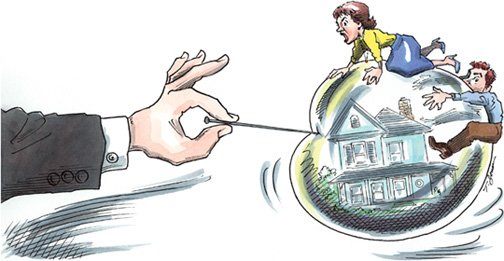Who Should We Find Responsible For The Subprime Mortgage Lending Crisis?
I want to preface this article by saying, I’m not 100% sure who we should blame for the Subprime Mortgage Lending Crisis, the lenders or the borrowers which is why I want to attempt to fairly give arguments from both sides. Even today this is a heavily debated topic and I agree with points made by both sides. So I want you to decide as the reader, who you side with, and if you want to post in the comments below. This article is meant to shed light on who we should hold responsible for the Subprime Mortgage Crisis, the lenders or the borrowers, or someone else?

The Lender’s Side of The Argument
The lender’s side of the argument almost completely revolves around the idea that people need to educate themselves before they go into a bank and take on such a series contract, like a mortgage. Even in many cases where the information was fully available to the borrower, they signed the contract even though they didn’t understand it. If you agree with consumer protection, the lenders should have stopped the transaction from taking place, but many believe that we should be free to make all decisions even bad ones. The truth is that these are companies, however and their only job is to look out for themselves. This lending is an especially weird occurrence because the force which usually stops this kind of behavior from taking place is that it would not be beneficial to the company, but mortgage brokers and the companies lending were making so much money that at the time it seemed like a good idea.

Another way the lenders justify their subprime lending practices was that they were getting pressure from higher up in the company to lend as much as possible because there was such a demand for the financial products on the markets. This is the old “I was just following orders” excuse, but there truly was heavy pressure from companies onto the brokers to loan as much as they could, or they would find someone else to do it. At the time most mortgage brokers legitimately didn’t think that they were doing something bad. They didn’t try to tank the system, they truly believed that the booming real estate market would be able to cover any losses if someone foreclosed on a property. We found out that this was a horribly wrong assumption eventually which lead to billions in toxic assets on the bank balance sheet worth nothing. Ultimately if you think that the consumer should have been diligent and did the required research before they took the mortgage contract, you might side with the side of the lenders
The Borrower’s Side of The Argument
On the flip side, the borrower’s side of the argument claims that it is a company’s duty to inform the customer and the government’s duty to provide consumer protection so mortgages that were created with a high chance of failure wouldn’t be possible. Borrowers also claim that many of the brokers specifically targeted low income and uneducated applicants so they could get a larger commission. In addition, the extreme leniency of the various types of mortgage products that were being offered at the time, for example not having to even show any income, should have been against the law. While not all brokers were predatory, there were many that were, which did target the low income and uneducated, but at the same time there were many borrowers who knew they couldn’t afford the payments on the house and figured they would just resell it for profit. Consumer protection is a tricky subject , because at what point does it stop becoming protection and start becoming a barrier to entry. For example up until this year only Americans with an income of 250k + or 1,000,000 in assets (disregarding primary residence) were able to invest in private companies, many hedge funds and other investment vehicles, all because of consumer protection.

Many people say that a fool and his money soon part ways and it’s hard to wonder if people who signed into these mortgages would have lost money elsewhere on credit cards or payday loans. I think that the mortgage prices that were way to complex for anyone to even understand should have never been offered, but is it the government’s place to protect a private entity from not offering them? Theoretically in a free market banks should not have offered the products because they were too risky and would have lost them money, but this force did not prevail. Whether or not you agree with the borrower heavily comes down to what degree you think consumer protection should play on your everyday life and how the government should police products.
Conclusion And Some Of My Thoughts
Like I said when I started the article I don’t think I find either party solely responsible for the subprime mortgage crisis that occurred. I believe both parties over leveraged themselves and took risks that, in hindsight, were insane. The world market wanted more mortgage prices and people all around the world were willing to pay large amounts for them, so banks and mortgage brokers supplied the demand that was out there. Unfortunately the mortgages they supplied them with were garbage. In this regard I blame the credit rating agencies, whose actual job is to rate them properly , for not doing their job. I also believe that the specific brokers and lenders who were predatory lending were morally wrong, but I’m not so sure that they constitute acting criminally. Maybe under current laws yes, but im someone who does not believe in consumer protection, mostly because I believe that people should be able to spend their money as they see fit on any product they see fit. We see 1000 scams on the internet a day, yet we don’t fall for them because we know they are scams. I think trusting any entity that is making money off you is foolish. Im interested to see what other people here think and why.
